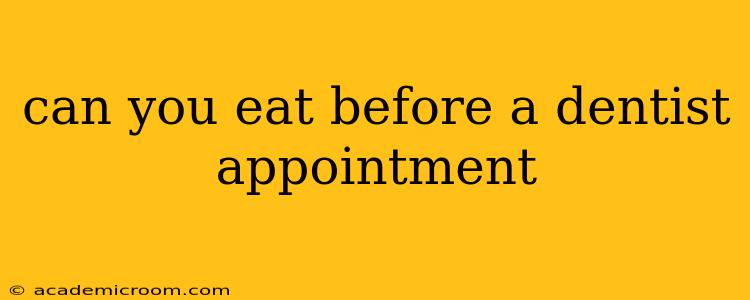Can You Eat Before a Dentist Appointment?
The simple answer is: it depends. Whether or not you can eat before a dental appointment largely hinges on the type of appointment you have scheduled. Some procedures require you to fast, while others don't pose any dietary restrictions. Understanding the nuances will ensure you're comfortable and prepared for your visit.
This comprehensive guide will explore the various scenarios and help you determine if eating beforehand is appropriate.
What if I need a cleaning or a check-up?
For routine cleanings, check-ups, or exams that don't involve anesthesia or any invasive procedures, you generally don't need to fast. Eating before these appointments is perfectly fine. However, it's advisable to avoid strong-smelling foods like garlic or onions, as the lingering taste might interfere with your dentist's ability to accurately assess your oral health.
What if I'm having a procedure requiring anesthesia or sedation?
This is where things change significantly. If you're undergoing a procedure that requires local or general anesthesia, or sedation, you'll almost certainly need to fast for a specific period beforehand. This is a crucial safety precaution to prevent aspiration (breathing in food or fluids into the lungs) while you are sedated or under anesthesia.
The specific fasting guidelines will be provided by your dentist's office. These instructions will detail how many hours you need to abstain from food and drink (including water, sometimes) before your appointment. Failing to adhere to these instructions can lead to postponement of your appointment and can have serious health implications. Always follow your dentist's instructions precisely.
What about drinking water before a dental appointment?
Drinking water is generally permitted before most dental appointments, even those involving anesthesia. However, your dentist might advise you to limit fluid intake in the hours immediately preceding the procedure, especially if sedation is involved. Again, always confirm with your dental office for their specific guidelines.
What if I'm nervous and want to eat something to calm my nerves?
While understandable, it's best to avoid eating anything if there's even a small chance your procedure requires fasting. The potential risks of aspiration far outweigh any benefit from eating to calm nerves. Instead, explore other relaxation techniques, such as deep breathing exercises or listening to calming music before your appointment.
Can I eat something after my procedure?
Once your procedure is complete and the effects of any anesthesia or sedation have worn off, you can resume eating and drinking as normal. Your dentist may offer specific post-procedure dietary recommendations, depending on the nature of the work performed. For example, following tooth extractions, you might need to stick to soft foods for a while.
In summary: When in doubt, always ask!
Don't hesitate to contact your dentist's office directly with any questions about dietary restrictions before your appointment. This is crucial for ensuring a safe and comfortable visit. Clear communication will prevent any complications and allow you to receive the best possible care. Their specific instructions should always supersede any general advice found online.
